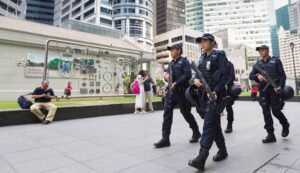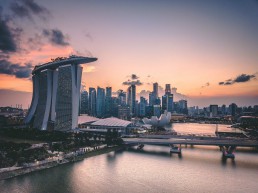The Choice Destination for Business
Singapore is known to be one of the top financial hubs in Asia. We have a strategic location, a competitive and talented workforce of varied backgrounds, and a pro-business environment for both local and foreign investments. It is easy to see why Singapore is your choice destination for businesses.
What the rest of the world says?

Based on the latest Doing Business 2020 report, Singapore is placed 2nd as the easiest economy to conduct your business in 2019, just closely behind New Zealand. Hong Kong follows at 3rd on this ranking. A closer look at the criteria shows that Singapore comes in first on “Enforcing Contracts”. This established strong confidence in entering into contracts of various purposes, from business contracts, employment contracts and leasing contracts. Any breach of a contract allows non-defaulting parties to carry out recourse in a lawful manner. Some of the other criteria that rank Singapore high on the list include ease of starting a company, dealing with construction permits, protecting minority investors and paying taxes.
Any tax exemptions?

Singapore has one of the most attractive tax structures among developed economies. From Year of Assessment 2020 onwards for the first 3 years for new start-up companies, there will be
- a 75% exemption on the first $100,000 of normal chargeable income and
- a further 50% exemption on the next $100,000 of normal chargeable income.
To qualify for this exemption, the company must
- incorporate in Singapore
- be a tax resident in Singapore for that YA
- have its share capital beneficially held by up to 20 shareholders throughout that YA
How is life in Singapore?

In Mercer’s global Quality of Living Survey released in March 2019, Singapore remains 1st in position in Asia-Pacific, with Tokyo and Kobe in 2nd and 3rd position respectively. This survey compares 230 cities worldwide across multiple factors such as political and social environment, consumer goods availability, housing, public services and transport, medical and healthcare, natural environment, education and recreation.
How risky is Singapore?

In another 2019 survey done by Euromoney, Singapore is the least risky country for investment in Asia. On the global scale, it ranks 2nd just behind Switzerland. This survey is conducted over 174 countries, among several hundred economists and risk experts across 23 political, economic and structural sub-factors. Some of these factors include access to capital markets and bank finance, debt indicators, credit ratings and political environment.
How safe is Singapore?

How about safety? In a 2019 Safe Cities Index report by The Economist Intelligence Unit, Singapore is 2nd safest city in the world. This report is based on 60 major cities across 57 indicators that cover personal security, health security, digital security and infrastructure security. Not only that, but Singapore also ranks 1st in both personal security and infrastructure security.
Is Singapore creative?

According to the Global Innovation Index 2019, Singapore is the leading innovation hub in Asia. This index compares 120 countries using indicators such as political environment, education, infrastructure, and business sophistication as its basis. We retain the top spot as Asia-Pacific’s most innovative nation for the seventh consecutive year.
2020 has been a turbulent year for the world, including Singapore. Many businesses have undergone a transformation in this new business landscape. We continue to strive to be the leading destination for businesses to flourish. If you like to find out more about doing business in Singapore, talk to us today.
Download the Telegram app and follow us for the latest updates: https://t.me/sgcompanyservices
The First Board Resolution Explained
The first board resolution is equivalent to an agreement among all owners of the company. Under the Accounting and Corporate Regulatory Authority legislation, it is a requirement for this document to be completed within a month from the date of the company’s incorporation.
Where it all begins...

This document serves to outline the basic structure of the company. It is usually prepared during the first board meeting, where the basic structure normally includes the following matters:
- Certification of Incorporation. This is the first and most important document to prove the status of any companies incorporated in Singapore. Upon successful incorporation, the regulatory body, known as ACRA (Accounting and Corporate Regulatory Authority) will issue this certificate. This certificate details information of the company such as the date of incorporation, registration number, names of shareholders and directors, and the amount of share capital the company has.
- Constitution of the Company. This is the rulebook of how the company will be run. It entails the business activities of the company, its legal name, to which all members are expected to act in accordance to.
- Appointment of directors and secretary. All directors and secretaries, whether local or foreign will be made known. To qualify as a director, the individual has to be
- At least 18 years old
- Of full legal capacity
- Either a Singapore Citizen, Singapore Permanent Resident or EntrePass holder
- Not of disqualified status to act as a director of a company, eg. an undischarged bankrupt
*an Employment Pass (EP) holder can only act as a director with a Letter of Consent (LOC) from the Ministry of Manpower
To qualify as a secretary, the individual has to be

- A natural person
- A local resident in Singapore
- Registered office address. If the company has no physical office or residence in Singapore, the company secretary's office or residence address is the registered office address. Otherwise, it is usually the company’s physical office based in Singapore.
- First and subsequent financial year-end. We determine the start and end of the company’s financial year-end by noting the following:
- The company’s first financial year must be within 18 months from the date of incorporation
- The company’s first financial year starts on the date of incorporation
- Subsequent financial years starts right after the end of the previous financial year and lasts a standard period of 12 months.
- Details of allotment and issuance of shares. To document the names of the recipient of the shares, the number of shares and the types of shares issued. Last but not least, to issue share certificates in hard copies to the respective shareholders.
For more information on the first board resolution or other incorporation matters in Singapore, talk to us today.
Download the Telegram app and follow us for the latest updates: https://t.me/sgcompanyservices
What is a Trust in Singapore?
What is a Trust?

In Singapore, you are able to set up a legal arrangement called a trust. A trustor or settlor initiates this arrangement, by entrusting a trustee to look after his or her properties, assets or any other possessions. The trustee is the person or entity that the settlor appoints to hold the legal title of the trust property and perform the duties required of him or her. The trustee can be the settlor himself or herself – in which case, the settlor declares himself or herself to be holding trust property on trust for the beneficiary.
Who is the Trustee?

The Trustees Act in Singapore provides a wide regulatory framework overseeing the operation of trusts and trustees. The trustee derives his power from the terms of the trust instrument. For instance, a trust deed may specify the trustee to invest the trust fund in low-risk unit trusts or investment-linked policies. The Trustees Act specifically confers certain powers on the trustee; However, these powers only apply if they are not contrary to the terms of the trust instrument. They include (non-exhaustively) the power to invest, insure, maintain minors, and advance the benefits of beneficiaries. Sometimes, you can also appoint a trust protector to ensure the trustee exercises his powers in accordance with the terms of the trust.
Together, the Act and common law stipulate a minimum standard trustee must adhere to. This includes the statutory duty to exercise reasonable care and skill in the discharge of his powers. It also includes exercising his discretion properly, and to abide by the directions of the trust instrument. In relation to the investment of trust property, the trustee has a wide range of duties to undertake. They include the duty to
1. Invest only in authorised investments.
2. Consider the standard investment criteria, such as the suitability of the investment and diversification.
3. Seek advice where it would be prudent to do so.
4. Take proper care and skill reasonably.
What does a trust encompass?

The trust details how the associated benefits of these possessions are passed to the eventual beneficiaries. Sometimes, the trustor and beneficiary can be the same person.
The assets that are commonly included in a trust are properties, bank accounts, investments, shares, patents, jewellery, or any items of tangible and intangible value. In contrast, trust does not include insurance policies, retirement account balances, health savings and motor vehicles.
You can create trusts by contract, will, or deed, collectively known as trust instruments. Deeds are usually used when no consideration is given for an agreement. Due to their complexity, it is advisable to engage the services of a lawyer. Your lawyer can offer specific legal advice in trust law, estate planning, and intergenerational wealth transfer.
Generally, certain requirements must be complied with in order to create a trust. They include:
1. Certainty of intention – The settlor must possess the requisite intention to create the trust obligation.
2. Certainty of subject matter – Trusts must be created over specific property.
3. Certainty of object – A trust usually may only be created in favour of legal persons (except purpose trusts).
4. Constitution – A trust is created when trust property is transferred, or via a declaration of trust whereby the settlor himself is the trustee holding property for the beneficiary.
5. Formalities – Statutory provisions regulating the creation of a trust or a will must be complied with.
6. Capacity – Settlor must have legal and mental capacity to create the trust.
Why do people set up a trust in Singapore?

Here are several benefits:
•There is no need for any formal registration with any government body.
•There are laws in place to maintain strict banking secrecy and personal data protection.
•A trust provides protection from forced heirship claims.
•The trustor can reserve part or all of the powers to him or herself.
•The trustor can appoint a protector to supervise the conduct of the trustees.
•There is no estate duty or inheritance tax.
•There is no capital gains tax.
Here are four common types of trusts in Singapore:

1. Private family trusts – usually for high net-worth individuals who planned to protect their assets, and properly distribute their wealth to their intended next of kin
2. Statutory trusts – mainly for statutory compliance purposes, such that they are structured for insurance policyholders and their beneficiaries.
3. Charitable trust – set up with the purpose to benefit a certain cause or group of people as a form of charity.
4. Collective investment trusts – trust that deals with business trusts, unit trusts, and real estate investment trusts (REITs).
What is a breach of trust?

1. A breach of trust may be deliberate or inadvertent.
2. It may consist of an actual misappropriation or misapplication of the trust property, an investment or other dealing which is outside the trustees’ powers.
3. It may consist of a failure to carry out a positive obligation of the trustees.
4. It may be injurious to the interests of the beneficiaries or be contrary to their benefit.
How much to set up a trust in Singapore?
Depending on the type of trust and assets involved, it can cost you around S$3,000 to S$10,000 to set up a trust. Reasons for setting up a trust usually revolve around wealth control within the family, efficient distribution to the rightful beneficiaries, and protecting assets from creditors and lawsuits. If you like to find out more about setting up a trust here in Singapore, talk to us today.
Download the Telegram app and follow us for the latest updates: https://t.me/sgcompanyservices



